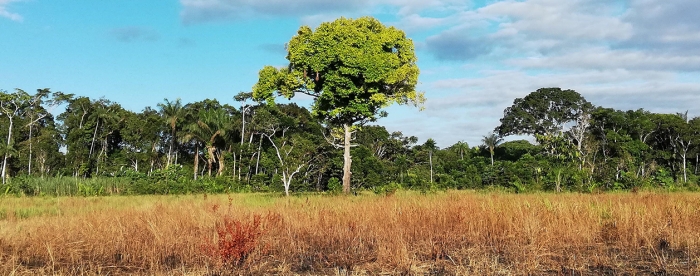News
Our stories ... ...

the Netherlands - 24 April, 2020
At first sight, the COVID-19 crisis seems to have little to do with the way people manage their agricultural lands and forest resources. But the opposite may be true.
Researchers have suggested that deforestation and wildlife trafficking are underlying causes of zoonotic diseases—diseases that are transmitted from animals to people. A recent study from Stanford University shows that deforestation in Uganda has increased physical interactions between humans and wildlife, and each interaction is an invitation for a virus to jump from animals to humans, and vice versa. Other publications—e.g. on forest fires in the Amazon, the start of the Ebola epidemic in Guinea, and corona viruses in general—come to similar conclusions.
The possible link between deforestation and the current pandemic captures the imagination, and has received some media attention. But there is more to say about the relationship between the current crisis and the management of land and forest resources. A recent (digital) meeting of members and partners of Tropenbos International, brought up at least two other possible relationships.
Many landscapes in the forested tropics are seeing a rapid expansion of agro-commodities such as oil palm and soy, that are often produced for far-away markets. These monocultures are replacing landscape mosaics that consisted of different land uses, providing a variety of products, including cash crops, food staples, vegetables, fruits and animal protein. In short: the productive diversity is lost. While the merits and flaws of specialization and diversification have long been a topic of debate, one of the arguments against specialization is that this increases people’s vulnerability to shocks. The pandemic is now putting these systems to the test. With COVID-19 measures restricting the movement of freight and people, communities depending on food from other places are at greater risk.
In Bolivia, the situation is worrying in communities where people have stopped producing staple foods, says Nataly Ascarrunz, Executive Director of the Bolivian Institute of Forestry Investigation. Measures to prevent the spread of the virus are limiting people’s ability to buy and sell products at the market, which directly threatens their food security. Indigenous communities are especially vulnerable and at risk. In contrast, according to Alphonse Maindo, Director of Tropenbos DR Congo, the communities where his organization is active are not at immediate risk of food shortages. This is because they cultivate a variety of food products, mostly for subsistence purposes. The situation in the cities, he says, is a different story. Cities depend to a large extent on imported foods, and imports are currently restricted. He stresses that the challenge in the coming weeks and months is to make sure that local farmers get their products to the cities, especially rice. An additional challenge is that local farmers are currently producing only small quantities of food; not enough to feed the cities for a longer period of time.
There are fears that the crisis triggers opportunistic behaviour by certain actors who are looking to convert forested lands for agriculture. According to Carlos Rodriguez, Director of Tropenbos Colombia, there is information that associates the crisis with excellarating illegal activities, such as coca cultivation and deforestion in protected areas, as well as continuous violence against local leaders and activists. This is because COVID-19 measures have resulted in a significant decrease in law enforcement. Also, some entrepreneurs and companies are trying to take advantage of the situation by asking the government to make procedures to obtain permits for resource extraction and plantation development more flexible. This would include, for example, the relaxing of environmental and social requirements, such as the condition to obtain free prior and informed consent of indigenous communities. There are legitimate fears that the economic downturn caused by the pandemic will encourage governments to develop policies that favour the expansion of agro-commodities, further speeding up deforestation.
Reports from other countries are also suggesting a relationship between the pandemic and deforestation. In North Sumatra, Indonesia, for example, activists claim that a palm oil company started clearing lands inside a community forest, ever since independent monitoring was suspended due to COVID-19 measures. In Brazil, activists are afraid that companies will take advantage of the chaos caused by the pandemic to encroach on indigenous territories.
The COVID-19 crisis raises important questions regarding the link between deforestation and the risk of pandemics, the link between the current pandemic and increased deforestation, and the link between modes of landscape management and food security in times of global crisis. Much is still unclear about such relationships, and how they will play out in these unprecedented times. In the coming weeks and months, we will explore these questions further, starting with an inventory of how the current crisis is affecting land-use and food security in the communities where we work. We need information from the ground, to know how to help communities cope with the crisis in the short-term, and to better understand what needs to be done to increase people’s resilience in the long-term.